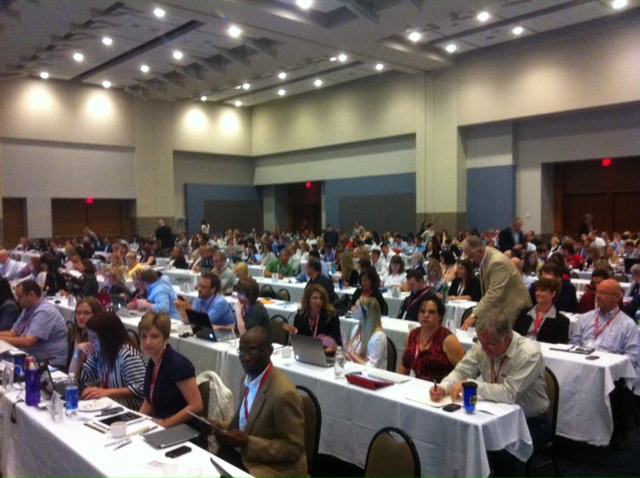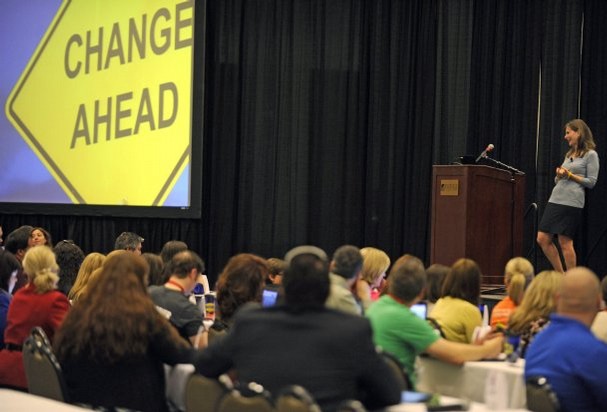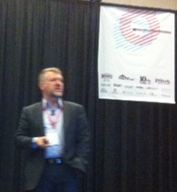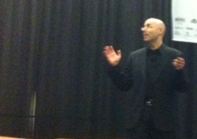I’ve occasionally used this blog to document my social media journey and in that spirit it would be impossible not to mention last week’s epic Social Slam event.
By successfully gathering 600 social media friends and fanatics and highlighting some of the coolest speakers and topics anywhere, this must be considered a milestone, a signature moment. And while I am filled with joy and pride for this event, I could not be honest with you without saying that the week was filled with trepidation. You see, success on the social web also breeds increasing risk.
Although Social Slam was spectacularly run by the Knoxville Social Media Club, my name is inexorably associated with the event as its founder and the person who puts the program together. Leading up to the event, I shuddered each time I saw somebody tweet that they were attending “Mark Schaefer’s conference.”
Ten years ago, if something went wrong at a conference, the damage would be limited to a little grumbling. If something failed at Social Slam, the news would spread though millions (yes, millions) of possible social media impressions. If the room was too cold, if the wi-fi didn’t work, if the lunch was awful — that is what would be recorded, that is what would be remembered. Potentially, that is what would go viral.
No person or company receives any direct financial gain from Social Slam. It is an entirely non-profit initiative so that we can keep the prices at a point where anybody can attend. In fact, that is our vision. If you attended an event featuring speakers such as Mitch Joel, Jay Baer and Gini Dietrich in New York, it would easily cost $1,500. Unless you’re working for a big company, who can afford that? You could come to Social Slam for $79 and get a whole day of content, networking, breakfast, lunch and an after-party to boot.
And yet, I realized that although this was entirely volunteer-driven (even the speakers donate their time) we would be inevitably compared to professionally-run events in big cities. In the era of the social web, there is no room for error any more.
As it turned out, I don’t know how it possibly could have been better. Here is the best indicator of success — You know when you go to conferences and see people milling about outside the main room doing emails and phone calls? During Social Slam the halls were empty. Everybody was stuck to their seats because the content was so amazing.
Yes, the wi-fi worked. The room was comfortable. The lunch was delicious. The parties were a blast. The speakers rocked. The social web hummed with positive comments.
And yet mid-way through the morning, the weight of the #soslam hashtag attracted the attention of porn spammers. The stream of “Mark Schaefer’s conference” was quickly hijacked with hundreds of disgusting tweets automatically produced by bots. Other companies, not even in attendance, tried to sell their wares by adopting the popular conference hashtag like little social media leeches. And unbelievably, even individuals in my home town (who I have never met) sat on their couches at home and threw darts at a conference they have never attended in a pathetic attempt to feed their need for attention.
The grotesque irony is that the better we are, the bigger the target becomes. The bigger the target I become, too.
And this leads me to the inevitable question — Why?
Why put myself through it? My business is thriving without it. My books are selling without it. My friends and students love me without it. Why work all these hours just to become a target for creeps?
Here is the lesson of taking big risks in the social era. Even if it pays off, you put yourself, and your brand, increasingly at risk. Success breeds hate and corruption. It always has, but now it’s automated and it’s amplified. So if you want to take a step on to the national stage, you better have a helluva thick skin.
I am still driven by this idea of creating an entirely new kind of social media destination. Of creating an event centered on relationships instead profit, on content that breaks new ground instead of re-hashing the most popular themes, on showcasing worthy new voices instead of the same 10 middle-aged white guys. How far can our passionate band of volunteers take this thing?
So, this is my way of saying thank you for your support … and yes, I’ll see you at Social Slam next year!
There has been a lot of content developed following Social Slam 2012 and here are some stand-outs I found:
- A nice short round-up from Chris Craft.
- Clinton Barnes took away lesson on trust and innovation that changed his perspective.
- Courtney Seiter takes a Storify-view of the proceedings (including the candied bacon!).
- Stanford Smith said he could write a book on his learnings but distilled Social Slam into six powerful ideas.
- Behind the scenes at Social Slam from an insider view at Pyxl.
- What a lovely post — Margie Clayman describes how Social Slam re-kindled her faith in social media
- Chuck Hemann writes about how Social Slam re-inspired his faith in conferences.
- Tom Webster posted about keeping his cool during a Social Slam fail.
- Doug Brock picked up on some great speaking tips from the Social Slam experts.
- Jenn Whinnem covers Social Slam from the angle of non-profits.
- Laura Click covers 10 quick tips from Social Slam.
- Debbie Andrews looks at 10 customer-facing takeaways from the event.
- One of our speakers, Billy Delaney, describes his experience being thrown into “the deep end of the social media pool!”
- Jayme Soulati records her take-aways with some video interviews of the speakers.
- 12 nuggets and some cool Social Slam photos from Rosemary O’Neill.
- Jeff Haws culled the day-long event into three major Social Slam themes.
- Dr. Alice Ackerman recounts the experience of speaking at her first social media conference.
- Brian Vickery of Denver did a video blog re-cap.
- Kristen Daukas creates an awesome tribute to the Women of Social Slam.
- For Davina Brewer, Social Slam was all about the connections.
- Marisa Peacock contends that Social Slam cut through the nonsense to deliver real value.
- Unique view from a SPONSOR perspective. How to turn this into B2B awareness from MLT Creative.
- Gary Schirr says it was weird to give a talk to a tweeting audience!
- And last, but not least, Tom Webster recites his favorite SoSlam hashtag spam as poetry.






